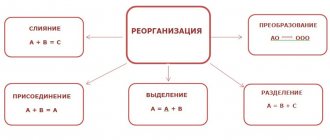During the reorganization, the work of employees, as a rule, does not change; they continue to perform it at their workplaces, without feeling the changes taking place in the company.
At the same time, the accountant draws up a plan of action for renewing employment contracts with employees, paying them vacation pay and benefits, if any, and correctly calculating insurance premiums and personal income tax.
When the reorganization comes to completion, the rights and obligations of the reorganized company (in the text we will call it “old” or “previous”) will transfer to the successor company (“new”).
As you know, labor legislation ensures the protection of workers' rights; during the reorganization of a company, the employer needs to resolve many important personnel issues. He will be able to do this based on material from the following articles of the Labor Code of the Russian Federation:
Article 72.1 of the Labor Code of the Russian Federation
It discusses the principles of transferring an employee to another job when he agrees to the transfer. However, this aspect is not fully taken into account in the article, because in fact, the previous place of work ceases to exist.
Article 74 of the Labor Code of the Russian Federation
It discusses changes to the terms of the employment contract in the event of a company reorganization. This article approves the requirement for mandatory advance warning of employees about proposed changes, including reorganization.
Article 75 of the Labor Code of the Russian Federation
It examines the ways of conducting labor relations when the ownership of a business entity is changed, as well as issues related to the reluctance of employees to work in a new company.
Article 77 of the Labor Code of the Russian Federation
The article lists a list of possible grounds for terminating the employment relationship between an employee and an employer.
Reorganization in itself is not a reason to terminate employment relations with employees. Consequently, the employment contract does not terminate. Even written consent from the employee to continue working with the new employer is not required by law.
However, there are employers who formalize the dismissal of employees from the “old” company, and then hire them to the new one. You understand that such manipulations will lead to additional expenses ; in this case, employees will need to be paid compensation for days of unused vacation. 127 Labor Code of the Russian Federation. In addition, dismissed employees are paid severance pay in the amount of average monthly earnings.
And if the employee does not find a new job, then he has the right to receive benefits for the second month. All he needs is to provide a work record book and an application. In my opinion, these actions do not provide any practical benefit to anyone and should not be done.
When changing not only the employer, but also the working conditions (except for job responsibilities) of an employee as a result of reorganization, the employer is obliged to notify the employee in writing about the changes at least 2 months in advance, Art. 74 Labor Code of the Russian Federation.
A special case is when, during the reorganization, the employee’s job responsibilities also change, but he does not agree with the changes. Then there is a need to lay off such an employee. But at the same time, he also needs to be warned in writing about the upcoming reorganization at least 2 months before the dismissal of the employee. 180 Labor Code of the Russian Federation.
According to paragraph 6 of Art. 77 of the Labor Code of the Russian Federation, an employee himself can refuse to work in a “new” organization and write a letter of resignation. There is no specific deadline for terminating an employment contract. But it is important for employees to understand that in this case there will be no payment of severance pay, as in the case of layoffs.
The new owner of the company, within three months from the date of acquisition of his ownership rights, has the right to terminate employment contracts with the head of the organization, his deputies and the chief accountant. At the same time, he is obliged not only to pay them severance pay, but also to comply with all the agreements that were specified in the contract with the “old” organization. For example, an additional “golden parachute”.
As you and I can see, under any circumstances it is imperative to warn employees about the upcoming reorganization. But there are some other features of the reorganization. More on them later.
Vacation of employees
There is no need to calculate and pay compensation for unused vacation days to employees, since you do not terminate the employment contract with them.
The vacation experience of employees in the “new” company includes work in the previous company, and the calculation of vacation pay will take into account their wages in both companies. The vacation schedule also remains valid.
There are cases when the “old” company does not transfer information about employees to the legal successor; the amount of vacation pay will need to be calculated only based on the earnings received from the legal successor.
Can they be fired during reorganizational changes in an institution?
To begin with, it should be noted that labor relations arising during the reorganization of a company, change of founder and other organizational changes are regulated by the provisions of Art. 75 Labor Code of the Russian Federation.
Reorganization of an economic entity means the transformation of legal entities, accompanied by the cessation of the activities of one or more organizations and the formation of new ones.
In accordance with Part 5 of Art. 75 of the Labor Code of the Russian Federation, reorganization (regardless of its form) is not a legal basis for the dismissal of employees.
In this case, management is obliged to offer its employees similar or other positions in the reorganized company . At the same time, if individual employees do not wish to continue their work in a new place, then only then can they be fired. In this situation, the basis for termination of the employment contract will be clause 6 of Art. 77 of the Labor Code of the Russian Federation - refusal of an employee to continue working in connection with the reorganization of the enterprise.
However, another situation can be considered. The management of the reorganized company, if necessary, has the right to reduce staff or personnel. In this case, the employment contract must be terminated on the basis specified in paragraph 2 of Art. 81 Labor Code of the Russian Federation.
FSS benefits
The assignee pays for all sick leave for employees of the previous company, issued before and after its reorganization, but only on the condition that the region is not a participant in the Social Insurance Fund pilot project. There is nothing wrong with the fact that these certificates of incapacity for work indicate the previous company , since they could have been issued before the reorganization. After all, in relation to employees, the new employer is the legal successor.
Calculation of benefits in full takes into account the wages of employees during the entire billing period in the old company. In turn, this company transmits all information on employee salaries and salary certificates from other employers presented when these employees were hired.
There are cases that information on wages was not transferred to the legal successor. Then the employees write you a statement asking you to make a request to the Pension Fund to receive salary data from the previous company. Before receiving information from the authority, calculate the amount of sick leave based on available salary data. And after you receive the data from the Pension Fund, recalculate and pay additional benefits.
If your company has employees who are on maternity leave at the time of reorganization, and their number of vacation days has been extended, then in this case you will need to pay extra for the additional days. Calculate the amount of the additional payment based on the same average earnings as in the original document.
Also, the reorganized company may have an employee on staff who is on parental leave. Such an employee does not need to write any new applications for leave and transfer of benefits. If the employee still receives monthly child care benefits for up to one and a half years, the “old” company accrues and pays it until the termination of operations, and the successor company begins to pay it in the same amount from the day the employee transfers to it.
Do I need to do this when joining another organization? Is it legal?
As a rule, a particularly urgent need to reduce the number of personnel arises in connection with reorganization in the form of annexation (Part 2, Clause 4, Article 57 of the Civil Code of the Russian Federation). In this case, two organizations merge at once, which leads to the appearance of extra workers.
As noted above, reorganization, including through merger, according to the law cannot be a reason for the dismissal of personnel.
However, termination of the employment contract is still possible. This can happen for one of the following reasons:
- the employee refused to move to a new job (position) that was offered to him;
- the staff or number of personnel has been reduced (if the employer has chosen such measures and the reduction procedure has been followed);
- the employee refused to continue working in another location (if the location of the reorganized company was changed).
When making a decision to dismiss, the employer must remember the categories of employees who cannot be laid off. We are talking about pregnant employees, women on maternity leave, etc.
Personal income tax and deductions
According to the Ministry of Finance, the former company itself must provide information about the income of employees in Form 2-NDFL from the beginning of the year until the moment of termination of activity, and not the successor (Letter of the Ministry of Finance dated July 19, 2011 No. 03-04-06/8-173).
The successor company will provide employees with standard tax deductions from the moment they began working for that company, taking into account wages received from the beginning of the calendar year in which the reorganization was carried out.
What to do with an employee who received a property deduction from his previous employer? As you know, the notification issued by the Federal Tax Service confirming the right to deduction includes the name of a specific employer. Therefore, in order to receive the rest of the deduction, the employee needs to receive another notice and give it to the accountant of the new company. The deduction will be provided from the month in which the employee brought a new notice and wrote an application for the deduction.
Reduction or liquidation?
It should be understood that reduction and liquidation, although similar to each other in terms of the procedure for parting with employees, still have different causes and consequences.
When a reduction occurs, the employer eliminates some of the positions available in the staffing table or reduces the number of employees occupying the same positions. During liquidation, the organization itself and, as a consequence, all existing jobs are abolished.
In the first option, after the employer makes the appropriate decision, only a portion of the employees face possible job loss. And this part can save their job by accepting the offer to move to the vacant position offered by the employer. In addition, the employer may change its decision and, in order to preserve jobs, introduce a part-time or part-time working week.
But in the second case, workers have no chance. Even those who are protected by labor legislation from dismissal for other reasons will be fired.
Similarities and differences of the considered grounds for dismissal.
Insurance premiums
The base for insurance premiums is calculated on an accrual basis from the beginning of the year. After the base reaches the maximum value (in 2021 - 1,392,000 rubles), contributions will be calculated at a rate of 10%. Hence, the question very often arises: is it possible for a successor organization, when determining the base for insurance premiums, to offset employee payments for the same year, but from the previous organization?
Alas, the answer will not please you - you can’t do this. According to the Ministry of Health and Social Development of Russia, in the event of reorganization, the successor organization does not have the right to take into account the base for calculating insurance premiums formed before the reorganization. It turns out that if before the reorganization the employee’s insurance premium base reached the limit (the previous company applied a 10% tariff), then after the reorganization the successor will have to apply a 22% tariff to him (if there is no right to benefits).
Forms of reorganization
When an enterprise undergoes reorganization, its legal status is terminated or changed, and the new organization receives all the rights and obligations of the legal entity. A mandatory part of such an action is the completion of the production activities of one company and the formation of a new company. These changes inevitably entail the dismissal of employees.
The process itself is very complex legally, since it does not boil down to a simple transfer of powers from one enterprise to another. Article 57 of the Civil Code of the Russian Federation establishes several types of reorganization:
Reporting
The old company, when filling out the DAM report, includes the amounts of payments to employees until the end of the reorganization. In turn, the new employer reflects the amount of payments of such employees from the first day of work with him in the calculation.
The reorganized company must provide personalized accounting information to the Federal Tax Service within 1 month from the date of approval of the transfer act in relation to dismissed employees.
As you and I can see, the accountant of the reorganized company has urgent matters to submit reports on personal income tax and insurance contributions before the organization ceases to operate. And the accountant of the successor company will not have any difficulties if the previous company transfers to it all the documents regarding the employees.
Features of dismissal
Upon dismissal due to reduction, the manager is obliged to offer the employee another vacant position in the company.
It must correspond to his qualifications, which may be higher or lower. If he agrees, he will be transferred to this position without dismissal. In such forms of reorganization as affiliation and merger, the manager is not obliged to warn employees about the changes.
If during the reorganization there is a change in the ownership of the property, the new owner can terminate the employment agreements with the director and all his deputies, as well as with the chief accountant within the first three months.
When carrying out the reorganization procedure, it is very important to comply with all legal norms in order to avoid possible fines.
Or on the website. It's fast and free!
Reorganization of a company always affects its entire staff. Often this procedure is accompanied by the dismissal of previous managers and a reduction in staff. The correctness of its implementation, as well as the execution of all necessary documentation for the dismissal of workers during the reorganization of the enterprise, is regulated by the regulatory legal acts of the Russian Federation.
Actions of the reorganized company
1. Notify each employee in writing about the upcoming reorganization. You can create a notification in any form.
2. Take a resignation letter from the employees in case of refusal to work for the successor. They can write the application in any form.
3. Formalize dismissals. Create orders for the dismissal of such employees. Based on these orders, make entries in the work book of workers who refused to work for the successor. If employees have switched to electronic work books, they must send the SZV-TD form to the Pension Fund with a record of dismissal.
Staff Notification
When a company is separated, merged or transformed, a legal entity ends its production activities, which always entails the dismissal of employees. Before this, the employer is obliged to notify all employees in writing about future changes. The notice should be drawn up in two copies, one of which is given to the employee, and the citizen signs on the other, confirming the fact of receipt of the notice and familiarization with the information contained in it.
All employees must receive notice 2 months before the start of the reorganization. This period allows the specialist to find a new job, and the employer has the opportunity to prepare the documentation necessary for the proper dismissal of the employee.
In such a situation, the legislation exempts citizens from the mandatory two-week work period, that is, every employee who is laid off can quit earlier. At the same time, the application indicates a reduction in staff as the basis for terminating cooperation.










